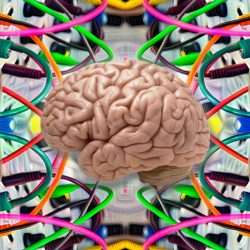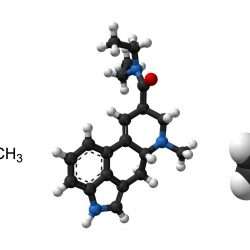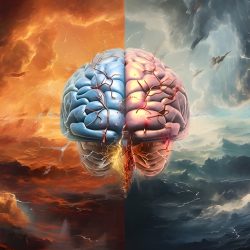♥ Support The Show ♥
Become a patron on Patreon
Leave a one-time PayPal Donation | Send some cryptocurrency
Buy a book | Buy some merch
***See below for a complete topic breakdown.***
Join us on Reddit at r/ATTMindPodcast to discuss this episode.
You are a collection of personalities under one roof; you are a complex system of many as much as you are one.
 The multiplicity of the mind being fundamental, and not necessarily pathological, is a central tenet of Internal Family Systems (IFS) therapy. IFS looks at the mind as a complex web of systems, composed of many ‘parts’. Each part is like a little personality inside you that serves different roles and takes on different functions. Sometimes, though, these parts can be wounded and, as a consequence, other parts take on extreme roles and those extreme roles manifest as the symptoms of psychopathology: be it extreme fits of rage, depression, addiction, or suicidality.
The multiplicity of the mind being fundamental, and not necessarily pathological, is a central tenet of Internal Family Systems (IFS) therapy. IFS looks at the mind as a complex web of systems, composed of many ‘parts’. Each part is like a little personality inside you that serves different roles and takes on different functions. Sometimes, though, these parts can be wounded and, as a consequence, other parts take on extreme roles and those extreme roles manifest as the symptoms of psychopathology: be it extreme fits of rage, depression, addiction, or suicidality.
Internal Family Systems therapy engages these parts in a way that allows for the healing of wounds and thus a deescalation of parts from their extreme roles. IFS does this through facilitating an inner-experience of healing one’s own wounds through connecting with “self-energy,” an energy of wisdom, compassion, creativity, and caring that is our birthright, something we all have and do not need to cultivate or build, simply connect with.
Internal Family Systems engages parts and helps us connect with self-energy in a way that is nearly opposite of the conventional approach of modern psychotherapy, which pathologizes parts in favor of feigned unity and suppresses symptoms in favor of behavioral expectations, neither of which leads to healing.
IFS is not just a therapeutic model, however, it is a paradigm for living. It is a mental/emotional skillset that can benefit our capacity to pass through our traumas, be they old, new, or actively in development. An understanding of Internal Family Systems, if only preliminary, provides an incredible opportunity for us to better connect with our self-energy so as to support our own parts in a process towards inner-systems of greater harmony, and thus greater harmony in our lives in general.
To help us get this preliminary understanding of Internal Family Systems, we welcome Dr. Frank Anderson.
 Frank Anderson, MD completed his residency and was a clinical instructor in psychiatry at Harvard Medical School. He is both a psychiatrist and a psychotherapist. He specializes in the treatment of trauma and dissociation and is passionate about teaching brain-based psychotherapy and integrating current neuroscience knowledge with the IFS model of therapy.
Frank Anderson, MD completed his residency and was a clinical instructor in psychiatry at Harvard Medical School. He is both a psychiatrist and a psychotherapist. He specializes in the treatment of trauma and dissociation and is passionate about teaching brain-based psychotherapy and integrating current neuroscience knowledge with the IFS model of therapy.
He is the vice-chair and research director of the Foundation for Self Leadership. He is a lead trainer at the Center for Self Leadership and maintains a long affiliation with, and trains for, Bessel van der Kolk’s Trauma Center in Brookline MA.
He has lectured extensively on the Neurobiology of PTSD and Dissociation and wrote the chapter “Who’s Taking What” Connecting Neuroscience, Psychopharmacology and Internal Family Systems for Trauma in Internal Family Systems Therapy-New Dimensions. He co-authored a chapter on “What IFS Brings to Trauma Treatment in Innovations and Elaborations in Internal Family Systems Therapy” and recently co-authored the book Internal Family Systems Skills Training Manual. Dr. Anderson maintains a private practice in Concord, MA, and serves as an Advisor to the International Association of Trauma Professionals (IATP).
Dr. Frank Anderson joins us on Adventures Through The Mind to explore the Internal Family Systems model of therapy and its perspective on the nature of mind, trauma, “triggers”, and the symptoms of mental illness. We also talk about the transpersonal context of the self, choosing to grow up in the face of our own traumas, IFS’ application to psychedelic therapies, and how to use IFS to navigate the challenges of the COVID-19 pandemic.
ಠ_ಠ
discuss this episode on our subreddit
♥ SUBSCRIBE TO THE PODCAST ♥
ITUNES | RSS | STITCHER | TUNEIN | GOOGLE PLAY | YOUTUBE | SPOTIFY
Episode Breakdown
- What is Internal family systems therapy?
- Systems thinking and the multiplicity of the mind
- Everybody is born with ‘self-energy’ and we don’t need to build it or cultivate it
- We all have multiple personalities, IFS calls them ‘parts’
- The problems of parts taking on extreme roles
- The different types of parts and their roles
- the two types of protective parts: mangers and firefighters
- the wounded parts: exiles
- All our parts have positive intention – even if those intentions have negative results
- How IFS is different than conventional therapy insofar as how it addresses ‘problematic behavior’: e.g. Cutting, addiction and suicide
- How important therapist authenticity of affect is during the co-regulation process between client and therapist
- The difference between managing symptoms and healing wounds
- What an IFS session looks like and the vital importance of ‘getting the permission of the protective parts’ before doing any healing work
- The client does the healing, the therapist is an adjunct
- Healing happened through the internal relationship between the self and the parts
- Self-energy: what is it, what does it feel like, what is its role and how do we connect with it
- How trauma impacts our relationship between the self and our parts
- In the IFS context of trauma, what does it mean to be an adult
- Growing up and healing trauma is a choice we need to need to make, even when our capacity to choose is different in different contexts (e.g. Systemic disenfranchisement)
- The metaphysics of choosing our trauma before being born as a spiritual process
- We all have the capacity to heal our trauma
- How does IFS understand psychedelic therapy, generally and specifically: MDMA, psilocybin, and ketamine
- There is such a difference between low dose and high dose ketamine insofar as doing therapy
- Low-dose ketamine psychotherapy using IFS protocol, compared to MDMA protocol
- The exciting potentials of how different psychedelic therapies can be optimized through IFS
- The impotence of differing between recreational, therapeutic, spiritual and harmful use
- An IFS interpretation of the imperial ACE psilocybin model
- Should therapists experience psychedelics before providing psychedelic therapy
- How does understanding IFS as a paradigm for living help us with or without trauma
- How to use self-facilitated IFS processes to deal with the trauma/pain/fear of the COVID-19 pandemic
- Unblending from our past so we can show up to what’s actually happening right now
Relevant Links
Frank Anderson, M.D. – Main Website
This is Dr. Anderson’s main page. Here you will find info about his books, his professional training and speaking, and his private psychotherapy practice. You can also sign up for his newsletter at the bottom of the front page.
Follow Dr. Frank Anderson on Instagram, Twitter, LinkedIn and Facebook
I am deeply grateful for you listening to the podcast!
If you enjoyed this episode, Please offer some SUPPORT for the expenses of producing it.
OFFER WHAT YOU CAN IN A ONE-TIME PAYPAL OR BITCOIN DONATION, OR you can BECOMe MY PATRON ON PATREON.
No amount is too small; anything is something.
You can also buy one of my books, an ATTMind TeeShirt or some Limited Edition ATTMind Blotter Art
Free support options include sharing this episode on social media or with a friend, subscribing on your favorite platform, signing up for my newsletter, or simply learning more about me.
THANK YOU!
*** Extra BIG thanks to my patrons on Patreon for helping keep this podcast alive! Especially, Thomas & Melanie H, Clea S, James R, Dean H, Joe A, Andy D, Stephen B, Ian C, David W, Don J, Yvette FC, Ann-Madeleine, Dima B, & Chuck W







